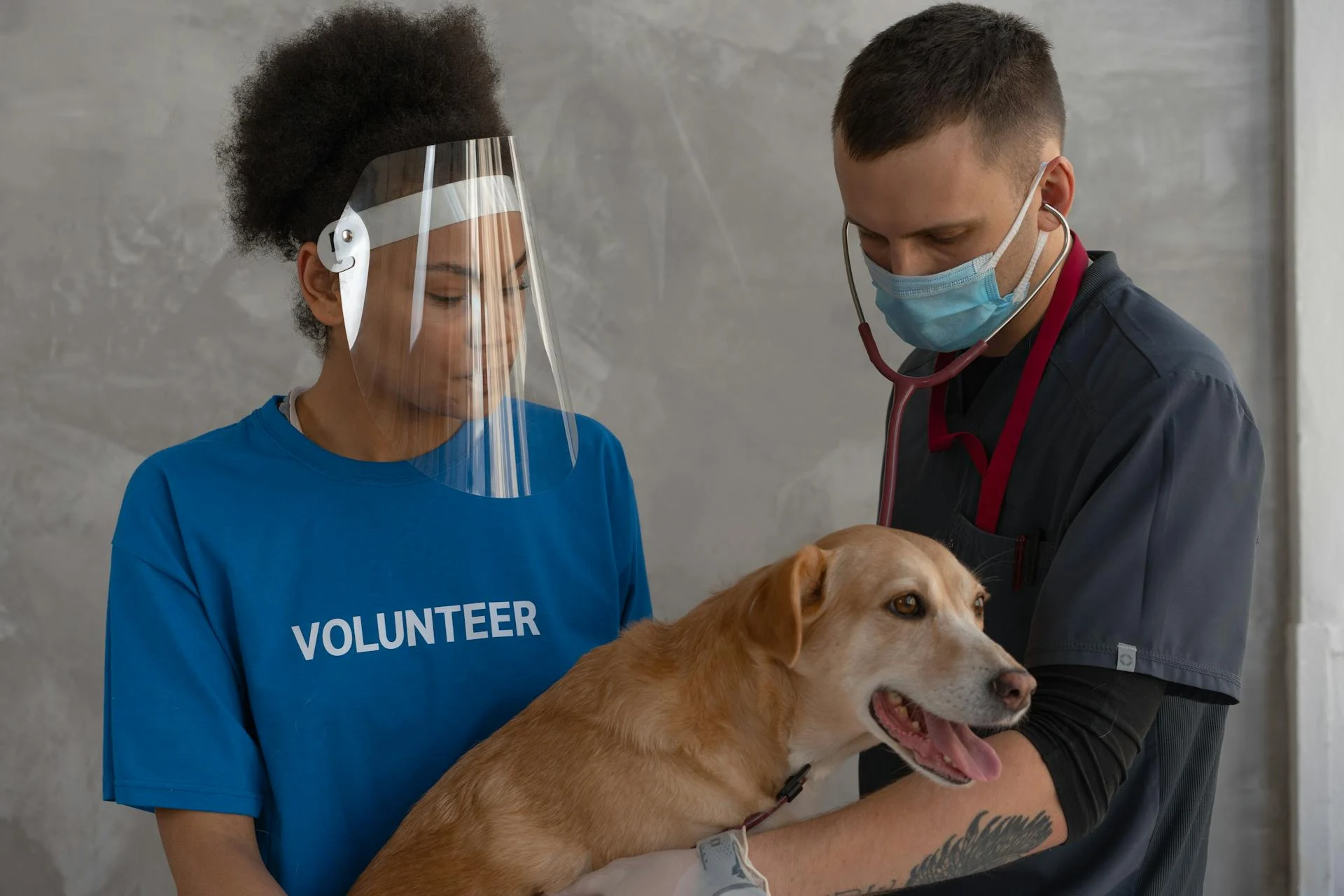
Pseudocyesis, also known as false pregnancy, is a condition where a dog exhibits all the physical and behavioral signs of pregnancy without actually being pregnant.
Some dogs can even go into a false labor, producing milk and preparing a nest for their puppies, only to realize they're not actually expecting.
This can be a stressful and confusing time for dog owners, especially if they're not aware of the condition.
Dogs with pseudocyesis often experience a range of symptoms, including milk production, nesting behavior, and a swollen abdomen.
Worth a look: Female Dog Phantom Pregnancy
What Is Pseudocyesis
Pseudocyesis, also known as false pregnancy, is a real phenomenon in dogs. It's not just a myth or a sign of a dog's imagination.
The exact cause of false pregnancy in dogs isn't fully understood, but it's believed to be related to hormonal imbalances. Sometimes, the chemical messages in a dog's body get their signals crossed and behave as if there are really puppies developing in the uterus.
Additional reading: Dog Names Female Start with S
A rapid decrease in progesterone and an increase in prolactin are thought to be responsible for pseudopregnancy. This hormonal shift can occur when the corpus luteum, which produces progesterone, stays in the body for a longer time than normal.
Anything that causes a fall in progesterone can lead to false pregnancy, including spay surgery if the dog has already reached puberty. This can be avoided by spaying dogs before they begin their first heat cycle, ideally before 6 months of age.
Symptoms and Diagnosis
If your female dog is producing milk but isn't pregnant, it's likely a case of false pregnancy. Dogs can exhibit behaviors associated with impending motherhood even if they're not pregnant, including mammary development and lactation.
Mammary development and lactation are common symptoms of false pregnancy in dogs. Your veterinarian may notice that your dog's mammary glands are swollen and producing milk, which can leak or be expressed by massaging them.
A fresh viewpoint: Female Dog Pregnancy Stages
Other signs of false pregnancy include abdominal distension, refusal to eat, nesting instincts, and mothering of toys. If your dog is showing any of these behaviors, it's essential to inform your veterinarian.
Here are some key signs to look out for:
- Mammary development and lactation
- Abdominal distension
- Refusal to eat
- Nesting instincts
- Mothering of toys
Your veterinarian will likely perform an ultrasound or take radiographs to rule out a true pregnancy and eliminate the possibility of serious conditions like pyometra. They may also run a canine pregnancy test to detect the presence of relaxin, a hormone that's only present during true pregnancy.
Recovery
A false pregnancy can be very interesting to observe, as it will become apparent how much mothering instincts a female dog possesses.
Most false pregnancies resolve on their own within two to three weeks, so be patient and give your dog time to recover.
Keep an eye out for signs of discomfort due to mammary gland enlargement and engorgement due to lactation, which can be relieved by alternating cold and warm compresses.
Your veterinarian may advise an abdominal wrap to apply pressure and reduce lactation, or to change your dog's routine by taking her on more walks and increasing the distance.
Temporary water reduction may reduce lactation due to borderline dehydration, but this is risky and should only be done under a vet's direct supervision.
Ignoring your dog's behaviors and showing her you're concerned can actually increase her anxiety, so try to remain calm and not react to her mothering instincts.
If your dog's behaviors continue for a long time, about eight weeks or longer, you should consult your veterinarian again for further guidance and potential medical procedures.
For another approach, see: Why Does My Male Dog Lick My Female Dogs Pee
Veterinary Advice
If your female dog is producing milk but isn't pregnant, it's likely due to a condition called pseudopregnancy, where her body prepares for a pregnancy without actually being pregnant.
Pseudopregnancy can be triggered by hormonal fluctuations, especially if your dog has recently been spayed or has a history of false pregnancies.
Female dogs can experience false pregnancies even if they've never been bred or haven't shown any signs of heat in years.
Some common signs of pseudopregnancy include a swollen abdomen, restlessness, and lactation, which can be accompanied by a strong maternal instinct.
Pseudopregnancy usually lasts around 2-3 weeks, but in some cases, it can persist for several months.
If you suspect your dog is experiencing pseudopregnancy, it's essential to consult with a veterinarian to rule out any underlying medical conditions that may be contributing to the symptoms.
Expand your knowledge: Signs a Female Dog Is Ready to Mate
Frequently Asked Questions
When I squeeze my dog's nipples, liquid comes out.?
Squeezing your dog's nipples and releasing liquid can be a sign of lactation or breast cancer. If you're concerned, consult a veterinarian for a proper diagnosis and advice
How to stop lactation in dogs false pregnancy?
To stop lactation in dogs experiencing false pregnancy, a medication like metergoline can be used, requiring approximately 4-5 days of treatment to restore normalcy. Consult a veterinarian for proper guidance and treatment.
Sources
- https://www.michigananimalhospital.com/site/blog/2021/11/30/dog-pregnant-signs
- https://amerivet.com/blog/signs-of-phantom-pregnancy-in-dogs/
- https://www.dailypaws.com/dogs-puppies/health-care/false-pregnancy-in-dogs
- https://wagwalking.com/condition/false-pregnancy-in-female
- https://www.pethealthnetwork.com/dog-health/dog-diseases-conditions-a-z/false-pregnancy-pseudocyesis-dogs
Featured Images: pexels.com


